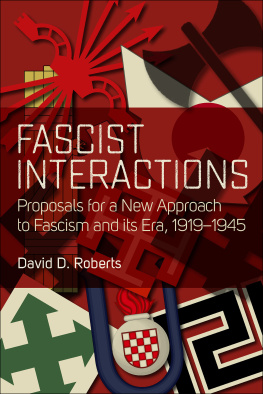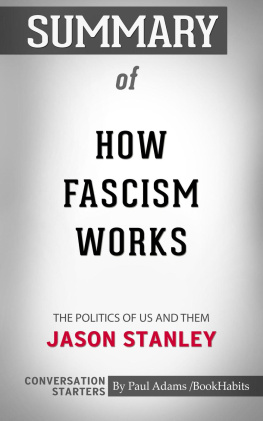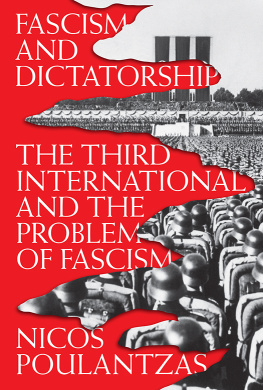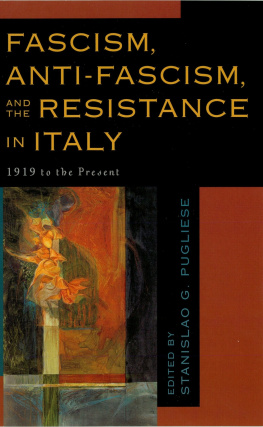Published in 2016 by
Berghahn Books
www.berghahnbooks.com
2016 David D. Roberts
All rights reserved.
Except for the quotation of short passages for the purposes of criticism and review, no part of this book may be reproduced in any form or by any means, electronic or mechanical, including photocopying, recording, or any information storage and retrieval system now known or to be invented, without written permission of the publisher.
Library of Congress Cataloging-in-Publication Data
Names: Roberts, David D., 1943
Title: Fascist interactions : proposals for a new approach to fascism and its era, 19191945 / David D. Roberts.
Description: New York : Berghahn Books, 2016. | Includes bibliographical references and index.
Identifiers: LCCN 2015041753 (print) | LCCN 2015048753 (ebook) | ISBN 9781785331305 (hardback : alkaline paper) | ISBN 9781785331312 (ebook)
Subjects: LCSH: FascismHistory. | FascismHistoriography. | FascismStudy and teaching (Higher) | Right and left (Political science)EuropeHistory20th century. | EuropePolitics and government19181945. | EuropePolitics and government19181945Historiography.
Classification: LCC D726.5 .R56 2016 (print) | LCC D726.5 (ebook) | DDC 320.53/309041dc23
LC record available at http://lccn.loc.gov/2015041753
British Library Cataloguing in Publication Data
A catalogue record for this book is available from the British Library.
ISBN 978-1-78533-130-5 hardback
ISBN 978-1-78533-131-2 ebook
PREFACE
The present book is an effort to assess the current state of fascist studies in light of calls for a new or expanded agenda. I do not hide my foundations as an Italianist, but my concern is not with Italy or any one country but with the aggregate, the totality of new responses on the Right in Europe during the era of the two world wars. The value of the long-controversial category generic fascism is thus centrally at issue, but so are questions about the degree to which fascism can be demarcated or isolated. After setting the stage in .
Because the book is primarily an effort at reconceptualization, I provide no overall narrative frame, discussing, for example, the rise of fascism in Italy or Germany. In seeking to extend broadly, however, I have found it necessary to adjust my approach at certain junctures, so the reader will note an occasional shift in tone. Especially to encompass the highly symptomatic Austrian, Hungarian, and Romanian cases, something of a narrative framework seemed essential, in light of the complex interweaving of domestic and supranational interaction in all three. Only by seeing how each step led to the next, yielding a particular trajectory, can we grasp the idiosyncratic places of those cases in the new universe on the Right.
I am not an expert on any of those three countries and have followed standard secondary works. I hope to have contributed by extrapolating, drawing out implications, and placing selected aspects of each case in the wider context of the present study. In seeking to establish the framework, I found myself particularly indebted to the work of Paul A. Hanebrink on Hungary and Dennis Deletant on Romania, each cited liberally in .
I proceed primarily by means of examples, and obviously I have chosen those that seem especially challenging and illuminating. By examples I first mean particular episodes or phenomenaor juxtapositions, comparisons, and distinctions. But I also mean particular scholarly accounts, interpretations, and uses of categories. Because there is much interweaving, I repair frequently to variations on as we have seen, which seemed necessary to keep the intersecting components of the argument clearly in focus.
I have been concerned with the problem of fascism since my first graduate colloquium at Berkeley with Richard Webster during the fall semester of 196566, a mere half-century ago. Indeed, it was partly that problem that led me to pursue graduate study in history in the first place. Even after treating Fascist Italy and Nazi Germany at some length in a book on totalitarianism published in 2006, I knew there were questions about generic fascism, and our efforts to get a handle on it, that I still needed to address.
But the present book was stimulated especially by three opportunities over the last several years. First, I was invited to participate in a workshop on Fascism and Para-Fascism: Toward a Theory of the Fascist Regime, organized by Antnio Costa Pinto and Aristotle Kallis and held in Lisbon in November 2009. I remain grateful to Professors Costa Pinto and Kallis for the occasion to participate and for including my paper, which I revised extensively in the aftermath, in the recently published volume Rethinking Fascism and Dictatorship in Europe (Palgrave Macmillan, 2014), which grew from the workshop.
Second, I was invited in 2011 to contribute an annotated bibliography on The Challenge of Fascism to Oxford Bibliographies Online. I ended up including 260 entries, now to be found in Oxford Bibliographies in International Relations, edited by David Armstrong (New York: Oxford University Press, posted May 2013). This enterprise enabled me considerably to extend my range.
Third, thanks to an invitation by Constantin Iordachi, I presented a lecture entitled Totalitarianism and the Search for a New Agenda in Fascist Studies at the Central European University in Budapest, in May 2013. I remain grateful to Professor Iordachi and his colleagues and students for the opportunity to discuss my work.
In the chapters that follow I have indicated Fascism in uppercase only when referring to Italian Fascism or Fascist Italy. Because the book is about the new Right, though to some extent in its interaction with the Left, I have rendered both Right and Left in uppercase, even when used in adjectival forms, for the sake of clarity.
The book is dedicated to Beth Louise Ellis Roberts, my wife of almost fifty years. Ive persuaded myself that she never wearies of hearing me talk about fascism, but we do discuss other matters on occasion.
Chapter 1
NEW RESTIVENESS, NEW POSSIBILITIES, AND UNFINISHED BUSINESS IN FASCIST STUDIES
The New Restiveness against a Backdrop of Uncertainty and Contest
Among students of fascism we find evidence of renewed restiveness, even calls for a new agenda. Some propose that we are entering nothing less than a new age of fascist studies. That interaction certainly involved regimes and movements generally considered fascist, but it extended to wider reaches of the political Right and even beyond, raising questions about the significance of the embeddedness of fascism in a network of relationships.
The restiveness and assertiveness reflect new concerns, though these are interwoven with others that have been evident for decades. Indeed, before considering examples of the new restiveness, we must note that the new thinking has emerged against a backdrop of ongoing disagreement and contest that must be kept in mind. And whereas the proposed new directions surely promise to deepen the discussion, it is not clear that they adequately address all the unfinished business. Moreover, some seem to carry the potential for new modes of waywardness or overreaction. Considering together several instances of the new thinking reveals tensions that seem symptomatic and instructive.













